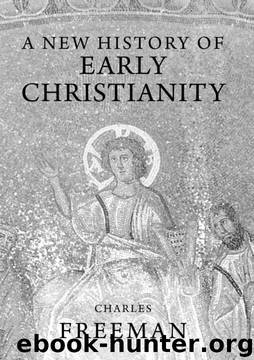A New History of Early Christianity by Charles Freeman

Author:Charles Freeman [Freeman, Charles]
Language: eng
Format: epub, mobi
Published: 2009-12-28T17:11:00+00:00
HERE COULD HAVE BEEN FEW BACKDROPS MORE CONDUCIVE TO intellectual creativity than the great city of Alexandria. Founded by Alexander in 332 BC, Alexandria flourished as the major port of the eastern Mediterranean, its lighthouse one of the `Seven Wonders of the World'. The Ptolemies, the Greek dynasty that succeeded Alexander, had been major patrons of culture and the city soon became the leading centre in the Greek world for science and mathematics. The library was the most impressive in the world even if its ambition of having a copy of every single Greek text was never realised, while the Mouseion, `the place of the Muses', acted as a meeting place for scholars. The Mouseion was ridiculed by some as no more than a talking shop for intellectuals but the Romans sustained it after they had incorporated Egypt into the empire in 30 Bc and the accredited scholars still enjoyed tax exemptions and free meals. The astronomer Ptolemy spent most of his life there in the second century working on his studies of the stars and the natural world. The city was, of course, embellished with fine buildings. A massive temple, the Serapeion, dedicated to the Egyptian god Serapis, stood on Alexandria s highest hill. For many it was the most impressive shrine in the entire eastern Mediterranean. While he was growing up, Origen, the subject of this chapter, would have seen it being rebuilt in an even grander form. No less impressive was the Caesareum, alongside the harbour. Built in honour of Julius Caesar by his lover Cleopatra, the last of the Ptolemies, this temple was the seat of the Roman imperial cult and in the fourth century was to become the city's Christian cathedral.
As with any prosperous and prestigious port, Alexandria had a vibrant mix of cultures. The Greeks were dominant but there was also one of the largest communities of Jews in the Mediterranean as well as a busy quarter of native Egyptian weavers. Sometimes tensions boiled over: there were riots in AD 115-17 that targeted Jews, and others against Christians in 248; Alexandria had the reputation of being a violent city. However, for much of the time the population lived together in relative peace and there was some mingling of intellectuals from the different communities. The Jew Philo's respect for Greek culture and philosophy has already been discussed and Philo's brother Alexander was a close friend of the scholarly emperor Claudius. The brilliant `gnostic' Valentinus had come from Alexandria. In the third century, the links between Christian and pagan intellectuals remained close as we have already seen in the life of Clement. This was a city where a tradition of tolerant debate made it possible for Christians to use philosophy creatively and Origen was foremost among them.
To many Christians of the third and fourth centuries, Origen was an intellectual hero. The scholarly Gregory of Nazianzus believed he was the greatest mind in Christian history; Eusebius of Caesarea, the biographer of Constantine, gave him a central place
Download
A New History of Early Christianity by Charles Freeman.mobi
This site does not store any files on its server. We only index and link to content provided by other sites. Please contact the content providers to delete copyright contents if any and email us, we'll remove relevant links or contents immediately.
| Buddhism | Christianity |
| Ethnic & Tribal | General |
| Hinduism | Islam |
| Judaism | New Age, Mythology & Occult |
| Religion, Politics & State |
Cecilia; Or, Memoirs of an Heiress — Volume 1 by Fanny Burney(31357)
Cecilia; Or, Memoirs of an Heiress — Volume 3 by Fanny Burney(30954)
Cecilia; Or, Memoirs of an Heiress — Volume 2 by Fanny Burney(30909)
The Secret History by Donna Tartt(16681)
Sapiens: A Brief History of Humankind by Yuval Noah Harari(13089)
Leonardo da Vinci by Walter Isaacson(11927)
The Radium Girls by Kate Moore(10929)
Sapiens by Yuval Noah Harari(4560)
The Wind in My Hair by Masih Alinejad(4431)
How Democracies Die by Steven Levitsky & Daniel Ziblatt(4430)
Homo Deus: A Brief History of Tomorrow by Yuval Noah Harari(4294)
Endurance: Shackleton's Incredible Voyage by Alfred Lansing(3859)
The Silk Roads by Peter Frankopan(3795)
Man's Search for Meaning by Viktor Frankl(3657)
Millionaire: The Philanderer, Gambler, and Duelist Who Invented Modern Finance by Janet Gleeson(3577)
The Rape of Nanking by Iris Chang(3531)
Hitler in Los Angeles by Steven J. Ross(3450)
The Motorcycle Diaries by Ernesto Che Guevara(3349)
Joan of Arc by Mary Gordon(3272)
